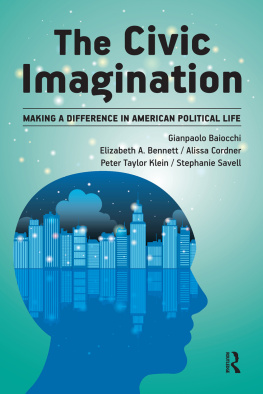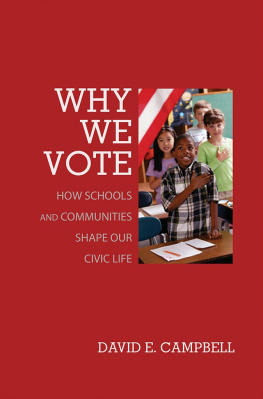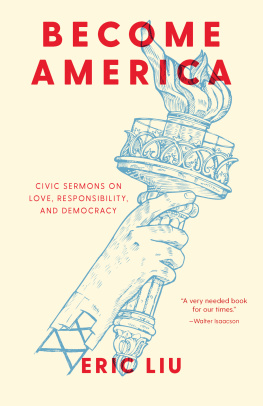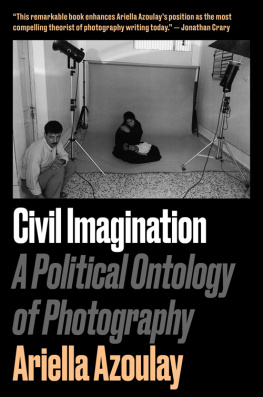Gianpaolo Baiocchi - The Civic Imagination: Making a Difference in American Political Life
Here you can read online Gianpaolo Baiocchi - The Civic Imagination: Making a Difference in American Political Life full text of the book (entire story) in english for free. Download pdf and epub, get meaning, cover and reviews about this ebook. year: 2013, publisher: Paradigm Publishers, genre: Politics. Description of the work, (preface) as well as reviews are available. Best literature library LitArk.com created for fans of good reading and offers a wide selection of genres:
Romance novel
Science fiction
Adventure
Detective
Science
History
Home and family
Prose
Art
Politics
Computer
Non-fiction
Religion
Business
Children
Humor
Choose a favorite category and find really read worthwhile books. Enjoy immersion in the world of imagination, feel the emotions of the characters or learn something new for yourself, make an fascinating discovery.
- Book:The Civic Imagination: Making a Difference in American Political Life
- Author:
- Publisher:Paradigm Publishers
- Genre:
- Year:2013
- Rating:5 / 5
- Favourites:Add to favourites
- Your mark:
- 100
- 1
- 2
- 3
- 4
- 5
The Civic Imagination: Making a Difference in American Political Life: summary, description and annotation
We offer to read an annotation, description, summary or preface (depends on what the author of the book "The Civic Imagination: Making a Difference in American Political Life" wrote himself). If you haven't found the necessary information about the book — write in the comments, we will try to find it.
The Civic Imagination: Making a Difference in American Political Life — read online for free the complete book (whole text) full work
Below is the text of the book, divided by pages. System saving the place of the last page read, allows you to conveniently read the book "The Civic Imagination: Making a Difference in American Political Life" online for free, without having to search again every time where you left off. Put a bookmark, and you can go to the page where you finished reading at any time.
Font size:
Interval:
Bookmark:
Alissa Cordner, Peter Taylor Klein, and
Stephanie Savell

2 Park Square, Milton Park, Abingdon, Oxon OX14 4RN
711 Third Avenue, New York, NY 10017, USA
Product or corporate names may be trademarks or registered trademarks, and are used only for identification and explanation without intent to infringe.
Baiocchi, Gianpaolo, 1971
The civic imagination: making a difference in American political life / Gianpaolo Baiocchi, Elizabeth A. Bennett, Alissa Cordner, Peter Taylor Klein, and Stephanie Savell.
pages cm
Includes bibliographical references and index.
ISBN 978-1-61205-305-9 (pbk.: alk. paper)
ISBN 978-1-61205-314-1 (library eBook)
1. Civics. 2. Political participationUnited States. 3. Political cultureUnited States. 4. Social changeUnited States. I. Title.
JK1764.B35 2013
306.20973dc23
ISBN 13: 978-1-61205-304-2 (hbk)
| Methodological Appendix A: How Many Scholars Does It Take |
Tatiana Andia |
Font size:
Interval:
Bookmark:
Similar books «The Civic Imagination: Making a Difference in American Political Life»
Look at similar books to The Civic Imagination: Making a Difference in American Political Life. We have selected literature similar in name and meaning in the hope of providing readers with more options to find new, interesting, not yet read works.
Discussion, reviews of the book The Civic Imagination: Making a Difference in American Political Life and just readers' own opinions. Leave your comments, write what you think about the work, its meaning or the main characters. Specify what exactly you liked and what you didn't like, and why you think so.








